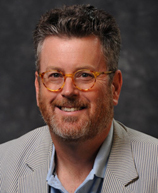
Last year, Political Science Professor and Department Chair Michael Desch put himself in the role of student, beginning an intense, guided reading of Catholic social doctrine on war, peace, and contemporary and historical statecraft. He then turned that research into an ambitious University Seminar for freshman that debuted this fall.
War and Statecraft in the Catholic Intellectual Traditionis distinctively Notre Dame—the type of course you will not likely find in a typical international relations program.
The class offers also an exhaustive appraisal of the subject matter; the reading list is not for the faint of heart. “I have a tendency to set the bar a little high for new courses,” Desch says.
Students who can get past the somewhat intimidating syllabus will be richly rewarded, says David Mastrovich, a first-year student from Rancho Santa Margarita, Calif. “It’s my favorite class of the week,” he says.
Mastrovich has always been keenly interested in the church’s role in history, so the new seminar was a natural fit. He says he especially appreciates the symposium style of the class and the thoughtful, if challenging discussions that style provokes. He also calls the class a unique opportunity for a small group of freshmen to “connect with the most distinguished member of the [political science] faculty.”
For his part, Desch says students are often surprised by what they discover about church tradition. “I don’t think the knowledge of church teaching and the evolution of church doctrine is a widespread thing,” he says.
Students are also impressed by how much the “American Creed” of Protestantism and radical individualism has affected the Catholic church and community in the United States, says Desch, particularly in their understanding of purposes of war and the primacy of peace. By studying church teaching, students can review events in U.S. diplomatic and strategic history with new eyes, provoking especially sharp reevaluations of the use of the atomic bomb at the end of World War II and the moral defensibility of U.S. war-making in Vietnam and Afghanistan.
“What stands out is that there isn’t one Catholic tradition on war and peace,” says Desch. “There are a number of different but related traditions that diverge in interesting ways.”
Desch specializes in international relations with emphases on international security, political theory and international relations, and American foreign and defense policies. His course development work for War and Statecraft in the Catholic Intellectual Tradition was funded by a grant from the College of Arts and Letters’ Institute for Scholarship in the Liberal Arts and led by Daniel Philpott, associate professor of political science and peace studies.
Learn More >